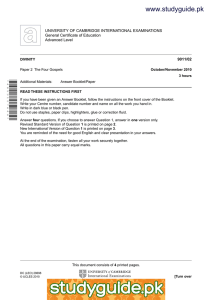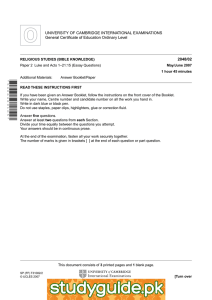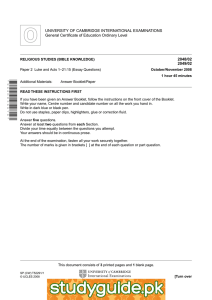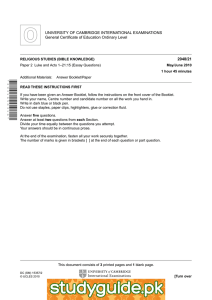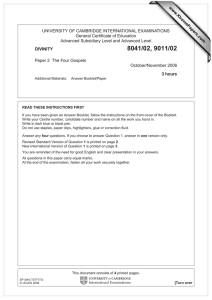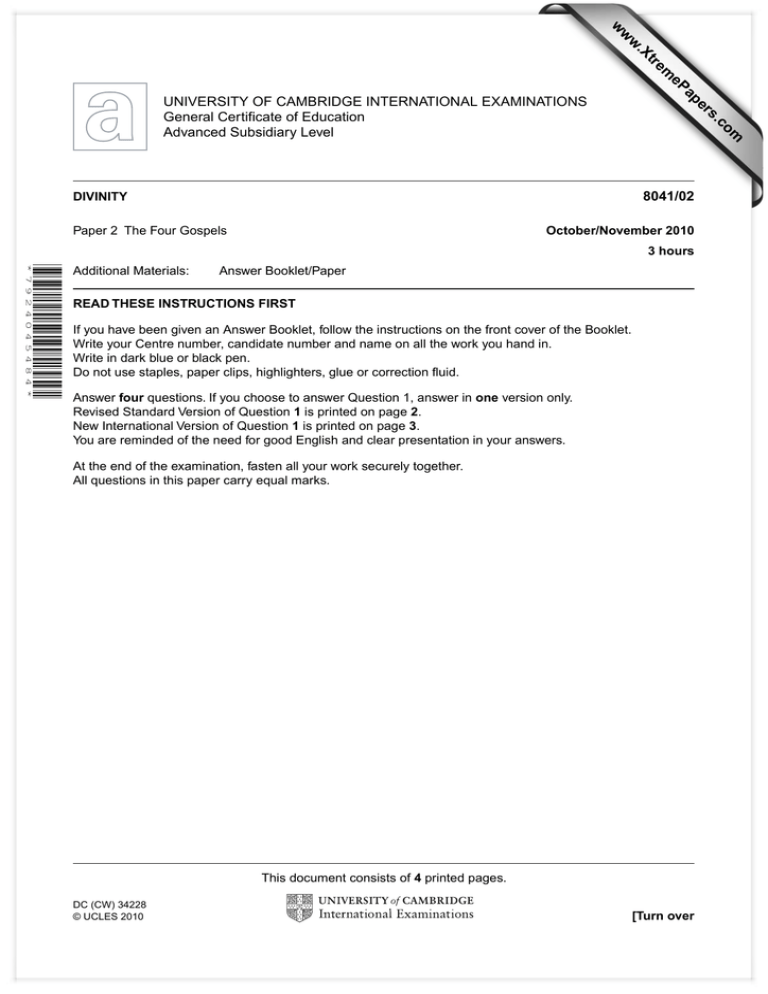
w
w
ap
eP
m
e
tr
.X
w
om
.c
s
er
UNIVERSITY OF CAMBRIDGE INTERNATIONAL EXAMINATIONS
General Certificate of Education
Advanced Subsidiary Level
8041/02
DIVINITY
Paper 2 The Four Gospels
October/November 2010
3 hours
* 7 9 2 4 0 4 5 4 8 4 *
Additional Materials:
Answer Booklet/Paper
READ THESE INSTRUCTIONS FIRST
If you have been given an Answer Booklet, follow the instructions on the front cover of the Booklet.
Write your Centre number, candidate number and name on all the work you hand in.
Write in dark blue or black pen.
Do not use staples, paper clips, highlighters, glue or correction fluid.
Answer four questions. If you choose to answer Question 1, answer in one version only.
Revised Standard Version of Question 1 is printed on page 2.
New International Version of Question 1 is printed on page 3.
You are reminded of the need for good English and clear presentation in your answers.
At the end of the examination, fasten all your work securely together.
All questions in this paper carry equal marks.
This document consists of 4 printed pages.
DC (CW) 34228
© UCLES 2010
[Turn over
2
REVISED STANDARD VERSION
1
Comment on points of interest or difficulty in four of the following passages (wherever possible
answers should refer to the context of the passage but should not retell the story from which the
passage is taken).
[25 marks]
(a) So all the generations from Abraham to David were fourteen generations, and from David to
the deportation to Babylon fourteen generations, and from the deportation to Babylon to the
Christ fourteen generations.
(Matthew 1:17)
(b) They do all their deeds to be seen by men; for they make their phylacteries broad and their
fringes long, and they love the place of honour at feasts and the best seats in the synagogues,
and salutations in the market places, and being called rabbi by men.
(Matthew 23:5-7)
(c) And he preached, saying, “After me comes he who is mightier than I, the thong of whose
sandals I am not worthy to stoop down and untie. I have baptized you with water; but he will
baptize you with the Holy Spirit.”
(Mark 1:7-8)
(d) And he came the third time, and said to them, “Are you still sleeping and taking your rest? It is
enough; the hour has come; the Son of man is betrayed into the hands of sinners. Rise, let us
be going; see, my betrayer is at hand.”
(Mark 14:41-42)
(e) Soon afterward he went on through cities and villages, preaching and bringing the good news
of the kingdom of God. And the twelve were with him, and also some women who had been
healed of evil spirits and infirmities: Mary, called Magdalene, from whom seven demons had
gone out, and Joanna, the wife of Chuza, Herod’s steward, and Susanna, and many others,
who provided for them out of their means.
(Luke 8:1-3)
(f)
And he said to them, “What is this conversation which you are holding with each other as
you walk?” And they stood still, looking sad. Then one of them, named Cleopas, answered
him, “Are you the only visitor to Jerusalem who does not know the things that have happened
there in these days?”
(Luke 24:17-18)
(g) When the steward of the feast tasted the water now become wine, and did not know where
it came from (though the servants who had drawn the water knew), the steward of the feast
called the bridegroom and said to him, “Every man serves the good wine first; and when men
have drunk freely, then the poor wine; but you have kept the good wine until now.”
(John 2:9-10)
(h) This man came to Jesus by night and said to him, “Rabbi, we know that you are a teacher
come from God; for no one can do these signs that you do, unless God is with him.” Jesus
answered him, “Truly, truly, I say to you, unless one is born anew, he cannot see the kingdom
of God.”
(John 3:2-3)
© UCLES 2010
8041/02/O/N/10
3
NEW INTERNATIONAL VERSION
1
Comment on points of interest or difficulty in four of the following passages (wherever possible
answers should refer to the context of the passage but should not retell the story from which the
passage is taken).
[25 marks]
(a) Thus there were fourteen generations in all from Abraham to David, fourteen from David to
the exile to Babylon, and fourteen from the exile to the Christ.
(Matthew 1:17)
(b) Everything they do is done for men to see: They make their phylacteries wide and the tassels
on their garments long; they love the place of honour at banquets and the most important
seats in the synagogues; they love to be greeted in the market-places and to have men call
them ‘Rabbi’.
(Matthew 23:5-7)
(c) And this was his message: “After me will come one more powerful than I, the thongs of whose
sandals I am not worthy to stoop down and untie. I baptise you with water, but he will baptise
you with the Holy Spirit.”
(Mark 1:7-8)
(d) Returning the third time, he said to them, “Are you still sleeping and resting? Enough! The
hour has come. Look, the Son of Man is betrayed into the hands of sinners. Rise! Let us go!
Here comes my betrayer!”
(Mark 14:41-42)
(e) After this, Jesus travelled about from one town and village to another, proclaiming the good
news of the kingdom of God. The Twelve were with him, and also some women who had been
cured of evil spirits and diseases: Mary (called Magdalene) from whom seven demons had
come out; Joanna the wife of Chuza, the manager of Herod’s household; Susanna; and many
others. These women were helping to support them out of their own means.
(Luke 8:1-3)
(f)
He asked them, “What are you discussing together as you walk along?” They stood still, their
faces downcast. One of them, named Cleopas, asked him, “Are you only a visitor to Jerusalem
and do not know the things that have happened there in these days?”
(Luke 24:17-18)
(g) And the master of the banquet tasted the water that had been turned into wine. He did not
realise where it had come from, though the servants who had drawn the water knew. Then
he called the bridegroom aside and said, “Everyone brings out the choice wine first and then
the cheaper wine after the guests have had too much to drink; but you have saved the best
till now.”
(John 2:9-10)
(h) He came to Jesus at night and said, “Rabbi, we know you are a teacher who has come from
God. For no-one could perform the miraculous signs you are doing if God were not with him.”
In reply Jesus declared, “I tell you the truth, no-one can see the kingdom of God unless he is
born again.”
(John 3:2-3)
© UCLES 2010
8041/02/O/N/10
[Turn over
4
2
Examine the importance of the Sermon on the Mount for Matthew’s gospel.
[25]
3
Assess Matthew’s treatment of Simon Peter in the discussions at Caesarea Philippi and at the
Transfiguration.
[25]
4
“Mark emphasises the humanity of Jesus.” Discuss.
[25]
5
Explain why Mark shows Jesus trying to keep his messiahship a secret.
[25]
6
Why did Luke write his gospel and for whom?
[25]
7
Explain the significance of the parables of the lost sheep, the lost coin and the lost or prodigal son
in Luke.
[25]
8
Discuss John’s theology of the Spirit.
[25]
9
Discuss the importance of the ‘I am’ sayings in John’s gospel.
[25]
10 To what extent can the miracles be seen as parables in action?
[25]
11 Examine the relationship between John the Baptist and Jesus in the gospels.
[25]
12 How far do the gospels present the kingdom of God as a future event?
[25]
13 Assess Jesus’ debates with the Pharisees.
[25]
14 Examine the gospel accounts of the trial of Jesus before Pilate.
[25]
Copyright Acknowledgements:
Scripture quotations marked (RSV) are from the Revised Standard Version of the Bible, copyright © 1946, 1952 and 1971 by the Division of Christian Education
of the National Council of the Churches of Christ in the USA. Used by permission. All rights reserved.
Scripture quotations marked (NIV) are taken from the Holy Bible, New International Version®. NIV®. Copyright © 1973, 1978, 1984 by International Bible Society.
Used by permission. All rights reserved.
Permission to reproduce items where third-party owned material protected by copyright is included has been sought and cleared where possible. Every reasonable
effort has been made by the publisher (UCLES) to trace copyright holders, but if any items requiring clearance have unwittingly been included, the publisher will
be pleased to make amends at the earliest possible opportunity.
University of Cambridge International Examinations is part of the Cambridge Assessment Group. Cambridge Assessment is the brand name of University of
Cambridge Local Examinations Syndicate (UCLES), which is itself a department of the University of Cambridge.
© UCLES 2010
8041/02/O/N/10

